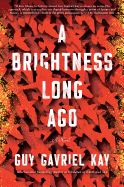
| Publisher: | Berkley | |
| Genre: | Renaissance, Fantasy, Literary, Fiction, Historical | |
| ISBN: | 9780451472984 | |
| Pub Date: | May 2019 | |
| Price: | $27 |
| Fiction |
by Guy Gavriel Kay
World Fantasy Award-winner Guy Gavriel Kay (Ysabel) returns to the world of Children of Earth and Sky in a standalone alternate-history adventure that revolves around Batiara, the author's version of Renaissance Italy.
Newly out of boyhood, Guidanio Cerra, a tailor's son from the city-state Seressa, finds that a quality education and his natural wit draw him into circles above his station. Engaged to serve at the court of Uberto the Beast, ruler of Mylasia, Danio recoils at his master's vicious appetites but has no power to stop him. When Adria Ripoli arrives at the court, Danio knows she has come as an assassin on behalf of her uncle Folco Cino d'Acorsi, a powerful mercenary who would love to add a port city like Mylasia to his holdings. Danio must choose whether to reveal Adria's identity or allow her to proceed, and his split-second decision brings unrest to the region.
As Folco and his rival mercenary commander Teobaldo Monticola di Remigio vie for dominance, fortune drags Danio into their paths repeatedly. At times, Adria Ripoli flashes back through his life like a bright ribbon in a windstorm. In a landscape of intrigue, political tension and murder, Danio will need every scrap of wit and luck he possesses to find his path to maturity.
Now an elderly man looking back on the passion and tumult of his youth, Danio reflects on "the choices we make. The person we become." A surefire hit for historical fiction and fantasy readers, A Brightness Long Ago further cements Kay's reputation as a wise and beguiling storyteller. --Jaclyn Fulwood, blogger at Infinite Reads
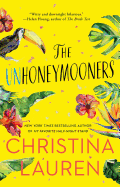
| Publisher: | Gallery | |
| Genre: | Women, Romantic Comedy, Humorous, General, Romance, Fiction | |
| ISBN: | 9781501128035 | |
| Pub Date: | May 2019 | |
| Price: | $16 |
| Fiction |
by Christina Lauren
Christina Lauren (My Favorite Half-Night Stand, Josh and Hazel's Guide to Not Dating) is the combined pen name of best friends and writing partners Christina Hobbs and Lauren Billings. And they nail the complicated but sweet sisterly relationship between twins Ami and Olive Torres in The Unhoneymooners.
Ami has been lucky her whole life and has won everything, from the buffet at her wedding reception to a fabulous 10-day Maui honeymoon, all for free. Olive, Ami's maid of honor, has always been unlucky, including being laid off from her job. This is their pattern--until the shellfish at the buffet turns out to have been contaminated, leaving only Olive and Ethan, the best man, standing. From her sickbed, Ami insists that Olive take the honeymoon trip with Ethan; since it was free, it can't be rescheduled. The lure of a no-cost vacation is tempting, but Olive has always disliked stuck-up Ethan, and isn't sure if she wants to spend that much time with her nemesis. Ethan and Olive decide to make the attempt, however, and head off to Maui, where the island aura--and being thrown out of their regular lives--makes the two realize that maybe they have more in common than they'd thought.
Lighthearted, laugh-out-loud funny and all too accessible (as the many Torres aunts and cousins keep butting into Ami's and Olive's lives), The Unhoneymooners is delightful. Olive's initial dislike of Ethan, tempered by her slow realization of his good qualities, makes for a charming and enjoyable romance. --Jessica Howard, bookseller at Bookmans, Tucson, Ariz.

| Publisher: | Milkweed Editions | |
| Genre: | Small Town & Rural, Literary, Coming of Age, Fiction | |
| ISBN: | 9781571311207 | |
| Pub Date: | May 2019 | |
| Price: | $16 |
| Fiction |
by Geneviève Damas, trans. by Jody Gladding
If You Cross the River is the ominous threat made to François Sorrente by his hostile father, Jacques, in Geneviève Damas's slender but excellent novel, translated by Jody Gladding. Across the river is where François's beloved older sister, Maryse, fled, and where the burnt-out remains of the Bridge Farm (so named for the wooden bridge that no longer exists) loom, mysterious and menacing. Indeed, much for the illiterate pig-tender François is mysterious and menacing. A self-proclaimed simpleton, he actually has considerably more awareness than he realizes or credits, noting, "In our house, no one cried, inside there were tears, but outside it was dry." His older brothers Jules and Arthur are cruel, his other brother Jean-Paul is dead and his mother disappeared just after his birth. Aside from his pigs, 17-year-old François is isolated and unloved.
A chance relationship with the village priest, who first reads to François and then teaches him to read on his own, offers liberation. However, the freedom is not easy, and François approaches it with trepidation: "Maybe books lie, maybe they do nothing but lie, so what's the use of reading, just to start hoping for things that won't ever happen."
Belgian author Damas's first novel unfolds quickly, but with much emotion. Readers will connect immediately with François and yearn, as he does, to uncover what happened across the river, uncover what happened to his mother and to Maryse. And while the denouement is neither wholly original nor unexpected, it still packs a satisfactory punch. --Evan M. Anderson, collection development librarian, Kirkendall Public Library, Ankeny, Iowa
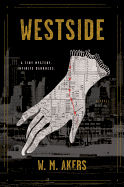
| Publisher: | Harper Voyager | |
| Genre: | Private Investigators, Mystery & Detective, Fantasy, Fiction, Historical, Women Sleuths | |
| ISBN: | 9780062853998 | |
| Pub Date: | May 2019 | |
| Price: | $22.99 |
| Science Fiction & Fantasy |
by W.M. Akers
Playwright W.M. Akers has crafted a wildly imaginative debut novel in Westside. Akers's gutsy heroine, Gilda Carr, inhabits an early 20th-century Manhattan split down the middle by a fence of wrought iron and barbed wire. While the Eastside is business as usual, the Westside is a nightmarish fantasy-scape, where the natural laws of the universe are subverted and people vanish into thin air. Amid this chaos, Gilda seeks out and solves "tiny mysteries"--who serves the best roast beef sandwich on the Eastside, what is producing the peculiar smell that permeates Washington Square--in an effort to avoid the big mystery that hangs over her life: What happened to her father? When asked to recover an Eastsider's missing glove, she's thrown into a mystery that will take her deep into the heart of the magic infecting the Westside.
The irrepressible Westside is equal parts Stranger Things and Doctor Who, with a healthy dose of hardboiled noir thrown into the mix, and it's an awesome combination. The setting is weird, wonderful and unsettling, while Akers's prose is atmospheric and occasionally lyrical. The one weak spot seems to be the story's strange insistence on Gilda's relative competence and cleverness, to the detriment of most of the other characters; at times they literally fall all over themselves. It's often entertaining, but feels a bit superficial. In all other ways, Westside is deeply, intricately creative and compelling. Akers's Westside is an excellent addition to the fantasy genre. --Judie Evans, librarian
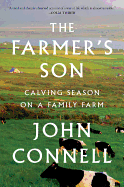
| Publisher: | Houghton Mifflin Harcourt | |
| Genre: | Biography & Autobiography, Family & Relationships, Nature, Technology & Engineering, Animals, Personal Memoirs, Animal Husbandry, General, Agriculture, Dysfunctional Families | |
| ISBN: | 9781328577993 | |
| Pub Date: | May 2019 | |
| Price: | $25 |
| Biography & Memoir |
by John Connell
As a young Irishman with literary ambitions, John Connell couldn't wait to escape his family's farm in County Longford. But after more than a decade away, he returned to his childhood bedroom, helping his father with the tasks of calving season and tending to the family's flock of sheep. An investigative journalist who has also published short stories and a novel (The Ghost Estate), Connell turns his sharp eye to memoir in The Farmer's Son. He explores the rural setting of his childhood, the long historical relationship between human beings and cows, as well as his own (slightly more fraught) relationship with his father.
Connell's rendering of farm life--mucking out the cows' stalls, chasing down errant sheep, the actual mechanics of delivering a calf--is sober and clear-eyed. In each day, each task, each argument (spoken or unspoken) with his father, Connell weighs the pull of the land and his family's history against the grit, blood and constant uncertainty of working with livestock.
There's no glamour in farming as Connell renders it; some of the bloodier scenes are like James Herriot without the cheeky humor. But there is a kind of everyday nobility in the quiet work. Connell is able to absorb himself in the mundane details of farm life and pull back for a broader perspective on farming and farmers. His book is neither a polemic nor an elegy, but a thoughtful, often luminous portrait of an ancient, valuable way of life that is in danger of disappearing. --Katie Noah Gibson, blogger at Cakes, Tea and Dreams
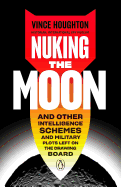
| Publisher: | Penguin Books | |
| Genre: | Intelligence & Espionage, 20th Century, History, Modern, Political Science, Military, World War II | |
| ISBN: | 9780525505174 | |
| Pub Date: | May 2019 | |
| Price: | $26 |
| History |
by Vince Houghton
Desperation makes for poor decision making. While Cold War paranoia may have rushed Americans to the first lunar landing, it also spawned ideas like the titular project of Nuking the Moon by Vince Houghton, historian and curator of the International Spy Museum in Washington, D.C.
Houghton chronicles 21 visionary, dumb or dangerous attempts by the U.S. military and intelligence agencies to spy on, sabotage or obliterate their enemies. He divides these escapades into four parts. The first involves animal subjects, from a house cat surgically wired with microphones by the CIA to fitting bats with incendiary bombs and the use of live chickens to keep nuclear landmines warm in Central Europe. Part two reveals absurd intelligence operations, such as Operation Northwoods, which proposed staging false-flag attacks on American citizens to justify war with Cuba. Part three shines light on outlandish technology, like plans to blanket Earth's orbit with anti-missile missiles. Part four explodes into the atomic age, including nuking the Moon (with Carl Sagan's help).
Houghton explores these foibles with insightful glee. While most of these projects were deadly serious, the sheer audacity of these attempts makes for entertaining reading. Houghton's prose is breezy, punctuated by amusing asides and historical insight. Nuking the Moon: And Other Intelligence Schemes and Military Plots Left on the Drawing Board is as funny as it is frightening. --Tobias Mutter, freelance reviewer
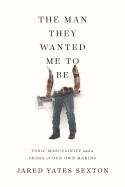
| Publisher: | Counterpoint | |
| Genre: | Biography & Autobiography, Feminism & Feminist Theory, Men's Studies, Personal Memoirs, Social Science | |
| ISBN: | 9781640091818 | |
| Pub Date: | May 2019 | |
| Price: | $26 |
| Starred | Social Science |
by Jared Yates Sexton
When Jared Yates Sexton was reporting on the 2016 presidential race (his observations fill his acclaimed book The People Are Going to Rise Like the Waters Upon Your Shore: A Story of American Rage), he saw that the "dark heart" of Donald Trump's campaign was guys with backgrounds similar to his own: they were white, working-class and living far from either coast. The Man They Wanted Me to Be: Toxic Masculinity and a Crisis of Our Own Making is Sexton's look at these men and his lifelong struggle to figure out his role among them.
Sexton, who was born in 1981 and raised evangelical in Linton, Ind., entwines scholarship about virulent masculinity's toxicity with personal experience: being taunted as a child for his sensitivity; his and his mother's poverty; their maltreatment at the hands of his father and stepfathers; his later difficulty sustaining healthy relationships with women. Sexton cites research on how "performative masculinity" markers, such as avoiding the doctor, contribute to the recent drop in men's life expectancy, and on how self-doubt in men correlates with hypermasculine behavior. "As men are taught that emotions are for women and the only acceptable means of communication is anger," Sexton writes, "their aggrieved entitlement is routinely finding an outlet in senseless violence."
While The Man They Wanted Me to Be offers glimmers of hope--Sexton recounts his father's transformation in the final years of his life from rage-filled tough guy into introspective Prius driver--the book is frankly alarming. It's also alarmingly good. --Nell Beram, author and freelance writer
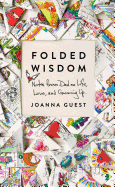
| Publisher: | Celadon Books | |
| Genre: | Family & Relationships, Parenting, Life Stages, Fatherhood, School Age | |
| ISBN: | 9781250207791 | |
| Pub Date: | May 2019 | |
| Price: | $20 |
| Parenting & Family |
by Joanna Guest
Every morning for 14 years, Bob Guest--artist, husband, father and man of routine who was "ahead of his time"--sat down to write notes to his children on a 6x9 pad of paper. Often folded like little footballs, the notes were tucked into lunchboxes or waiting on the kitchen counter. His daughter, first-time author Joanna Guest, was seven when they began. As an adult looking back at the more than 3,500 notes (out of roughly 4,775) that survived time and the family washing machine since 1995, Guest found wisdom and meaning in them that she couldn't fully appreciate as a child.
In Folded Wisdom, Guest shares the inception of the notes and how they progressed as she and her younger brother, Theo, grew older and their life problems became more complex. Bob was sparked by a desire to encourage Theo to read, and was dedicated to connecting with his kids. One of eight children of a rear admiral in the navy, Bob had a "minimal" personal relationship with his absentee father.
The notes, which often included puzzles and drawings, ranged from snippets of love and encouragement to pages of thoughts on what it means to be part of a family, deal with life and say "I'm sorry." As insightful and charming as the notes themselves, Guest's narration winds between photographs of the real deal. Folded Wisdom is a wonderful testament to love and to Bob's success in perpetuating thoughtfulness and value in expressing ourselves to others. --Lauren O'Brien of Malcolm Avenue Review
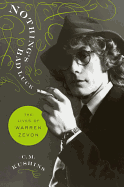
| Publisher: | Da Capo Press | |
| Genre: | Biography & Autobiography, Rock, Music, Genres & Styles, Entertainment & Performing Arts, Individual Composer & Musician | |
| ISBN: | 9780306921483 | |
| Pub Date: | May 2019 | |
| Price: | $29 |
| Performing Arts |
by C.M. Kushins
Near the end of his life, musician Warren Zevon (1947-2003) was asked if his cancer battle taught him anything about life and death. "...Enjoy every sandwich," he famously answered. Cheeky and merciless: this is the Warren Zevon profiled in Nothing's Bad Luck: The Lives of Warren Zevon by C.M. Kushins.
Zevon's early life was unsettled: his Mormon mother raised him while his Jewish gangster father was rarely around. He was an early prodigy on both piano and guitar, leading to a record contract while still a teenager. He was ill-prepared for the resulting temptations. "Both his life and burgeoning career had slowly become defined by stretches of genuine warmth and creative genius, yet punctuated by jarring moments of extreme jealousy and ingratitude." Zevon's growling voice, quirky, literate lyrics and classically influenced melodies became successful--strangely so for pop music. In a career that spanned more than 30 years, Zevon won Grammy awards and received widespread industry respect. Low points were many: years of addiction, which made him violent and unpredictable, a revolving door of wives and women and the mercurial tastes of the music industry that saw his work fall in and out of favor and contributed to his destructive behaviors.
In his first book, journalist Kushins relies on extensive documentation, including hundreds of interviews with Zevon's family, friends and colleagues. These give the reader an intimate, sometimes painful window into "the conundrum of Warren Zevon." Readers are advised to have Zevon's extensive catalogue queued up to accompany this absorbing, compelling biography. --Cindy Pauldine, bookseller, the river's end bookstore, Oswego, N.Y.
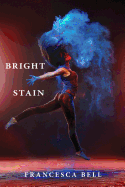
| Publisher: | Red Hen Press | |
| Genre: | Inspirational & Religious, Women Authors, Art, Love & Erotica, American, Death, Grief, Loss, Psychology, Subjects & Themes, Suicide, Social Science, Feminism & Feminist Theory, General, Family, Poetry, Erotica | |
| ISBN: | 9781597098618 | |
| Pub Date: | May 2019 | |
| Price: | $16.95 |
| Starred | Poetry |
by Francesca Bell
Poet Francesca Bell shows she's one of the most exciting--and disturbing--voices in contemporary poetry with her dark and resplendent debut collection, Bright Stain.
Bell exhibits a thrilling fearlessness in her subject matter. These are poems about sex, crime, violence and desire. She employs multiple points of view to explore taboo characters like pedophile priests and serial killers. She even dramatizes the relationship between Thomas Jefferson and Sally Hemings. Mixed in with these narrative poems are lyrical pieces on sexual experience, the female body, divinity and redemption. The collection strips down each speaker, including the poet herself, to a visceral level. The sensuality is striking, and the reader is "laid open/ on the blade of its loveliness."
Bell takes an incredible risk in extending this sensuality to abusers and killers. There is always moral hazard in humanizing monsters. Yet the risk pays off, as Bell is able to elicit humanity, and even divinity, from the worst of the worst. "The Curator," for example, ends with notorious serial killer Jeffrey Dahmer being beaten to death: "He waited, patient/ on the prison's bathroom floor, for God/ who gathers our shards, every splintered/ fragment, into His boundless hands."
Bell reveals a faith--if not in religion itself, then in religious experience--that is as vast as the pain her characters cause. There is something that binds this "world of hunger" together. It may be the ability to move beyond pain. Perhaps Bell's poem "Benediction" says it best: "May each loss leave/ only the bright stain/ of a new beginning."
Beware: Bright Stain is an addictive read, almost impossible to put down once started. --Scott Neuffer, writer, poet, editor of trampset

| Publisher: | Salaam Reads/Simon & Schuster | |
| Genre: | Death, Grief, Bereavement, Romance, Contemporary, Social Themes, Young Adult Fiction, Prejudice & Racism | |
| ISBN: | 9781534442726 | |
| Pub Date: | April 2019 | |
| Price: | $18.99 |
| Starred | Children's & Young Adult |
by S.K. Ali
Two Muslim teens, Adam and Zayneb, have each, independently, spent years writing journals inspired by an ancient book called The Marvels of Creation and the Oddities of Existence. In an odd and marvelous case of serendipity, the two meet on their way to Doha, Qatar. Adam, 18, has stopped going to classes at his university in London after receiving a life-changing piece of news. He disengages with the routine he had begun in college and instead hangs out in his dorm room, making things: tiny models, meaningful gifts, intricate creations. Now he's going home to Doha to--maybe--share his news with his sister and his dad, who is still grieving the death of Adam's mother nine years earlier.
Zayneb, also 18, is visiting her aunt in Doha after getting suspended from her Indiana high school for confronting an Islamophobic teacher. Zayneb is determined to become a better version of herself (more "poised and peaceful. Maybe quieter, too"), especially once she meets Adam, who seems to have far more self-control and optimism than she does. She writes in her journal about her frustration and anger at constantly being judged and stereotyped for being a hijabi. If only there was a way to confront injustice that fell between looking the other way or posting "a few words of outrage online" and "mak[ing] someone pay" for the horrors of war and prejudice. Although Zayneb's journal is heavier on the oddities and Adam's on the marvels, together they begin finding a way to live in a world with both.
In Love from A to Z, S.K. Ali (Saints and Misfits) once again takes an unflinching and moving look at the intricacies of life as a Muslim teen in an imperfect, multi-cultural world. Beautiful. --Emilie Coulter, freelance writer and editor
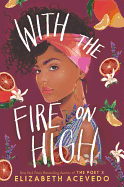
| Publisher: | HarperTeen | |
| Genre: | Values & Virtues, People & Places, Cooking & Food, Novels in Verse, Family, Coming of Age, Social Themes, Young Adult Fiction, United States - Hispanic & Latino, Multigenerational | |
| ISBN: | 9780062662835 | |
| Pub Date: | May 2019 | |
| Price: | $17.99 |
| Children's & Young Adult |
by Elizabeth Acevedo
Emoni is a high school senior who got pregnant with Emma (more commonly called Babygirl) during her freshman year. 'Buela has raised them both--after her mother died, Emoni's father returned to Puerto Rico, leaving her in Philadelphia with his mother; Babygirl's father, too, tends toward missing, reappearing for every-other-weekend visits with his daughter. Despite challenging circumstances, Emoni and Babygirl are thriving in their loving three-generation household.
Emoni has "magical hands when it comes to cooking." Her "innate need to tell a story through food" helps her create "straight bottled goodness that warms you up and makes you feel better about your life." This school year, Schomburg Charter is offering a "Culinary Arts: Spain Immersion" elective that includes a weeklong trip to Spain. Emoni can dream, but she knows the class would be an impractical choice. However, at BFF Angelica's insistence, she enrolls. Amid school, work and parenting, Emoni will need to figure out how to balance what she must do with what she wants to do.
Elizabeth Acevedo (The Poet X) turns to prose for her sophomore effort. Her writing remains undeniably insightful and breathtakingly lyrical, though at 400 pages, With the Fire on High lacks the spare sharpness of X. While her characters occasionally seem predictable--teenage mother, deadbeat father, sacrificing grandmother, mean boss--the positives here win. Acevedo's treatment of teenage pregnancy is fresh and honest, 'Buela gets a secret life of her own, Emoni's solutions are especially creative, deadbeat dads can surprise you, teachers and mentors always matter. With such distinctive ingredients combined with Acevedo's already established sizable audience, this Fire on High should undoubtedly prove to be a sizzling success. --Terry Hong, Smithsonian BookDragon